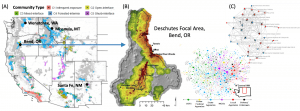Through empirical studies, we are investigating how intensifying disturbance regimes have affected wildfire management networks, and what factors appear to increase or inhibit their capacity to reduce risk. We seek to innovate the ability to use social network analysis to develop distilled representations of human and institutional relationships that appear likely to increase adaptive capacity to intensifying disturbance regimes. To this end, we are deploying surveys and conducting interviews with landowners, stakeholder groups and members of wildfire management networks. We will use the findings to engage our Stakeholder Council in exploring innovations in collaborative wildfire governance.
Empirical data and analyses are designed to both stand on their own and contribute to simulation model parameterization, setup and validation. We will build on existing data sets by collecting two main types of empirical data: (1) Household data in the Deschutes focal area; (2) Professional network data from wildfire risk managers in the Deschutes focal area and the other three IMW study areas (Figure 1). Nielsen-Pincus and Steel’s past efforts will be replicated for this project to provide a time series of data for the Deschutes focal area (2011, 2014, 2019, 2021) and a cross-section of different professional network topologies from selected comparator SES communities. Results will provide an empirical basis for testing H1, and will also be used to initialize the social network model topology and signal processing dynamics for the Deschutes focal area in our simulation modeling platform, Envision, to test H2.

Figure 3. (A) Western US showing areas of high wildfire exposure by WUI community type; IMW is dominated by forested intermix (blue) and mixed interface community types (green). (B) Deschutes focal area in central Oregon showing risk gradient to WUI communities. (C) Network representations of wildfire risk managers for the Deschutes focal area in 2011 (upper right), and the north central Washington region including Wenatchee in 2018 (lower right).